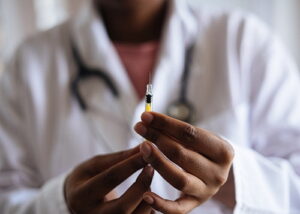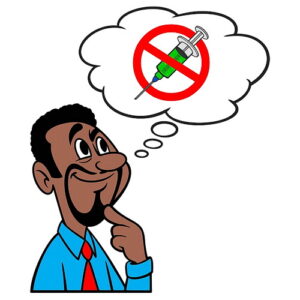
Are you ready to take the COVID-19 vaccine or have you been vaccinated already? And if you are not going to get the shot, why not? And if not, maybe we can convince you otherwise!
Last year we discussed the flu and how to stay safe. Now we have the COVID-19 virus, but we are making heavy strides in containing it.
The CDC recently reduced the age to 12, so now over 90% of the population in the United States is eligible for their vaccine shot and on May 13, the president announced that masks will not be required for all those who have been vaccinated, so we are definitely moving in the right direction.
According to a survey carried out in February 2021, 69% of Americans were either already vaccinated or were planning to get vaccinated. This percentage has increased compared to only 60% of Americans who wanted to get the vaccine late last year. Still, 30% of the respondents say that they won’t get the vaccine.

Aside from children below 12 years of age, the other remaining holdouts are people who are just not comfortable with getting the shot. Whether it be that they have a fear of potential side effects, religious reasons or that they just don’t have trust in the pharmaceutical companies, the government or both, they refuse to take the drug.
To clear the air and any misconceptions, we’re going to answer some of the most commonly asked questions about the COVID vaccines.
How Do the Vaccines Work?
Both Pfizer and the Moderna drugs refer to a new type of biotechnology known as mRNA; that is, it teaches our cells to make proteins that fight off the virus. Unlike several other types of vaccines that generate an immune system response by injecting a weakened form of a virus into the body, the mRNA vaccine teaches the cells to generate an immune response independently. It performs this function by sending instructions to part of the spike protein found on the surface of the virus (those orangy intrusions seen in the electron microscope images). Once these instructions are ‘read’ and activated, the immune system will go after them to destroy them.
Which are the Most Promising COVID Vaccines?
Here is a list of the most common COVID vaccines being used around the globe.
Pfizer-BioNTech
 According to an independent analysis published in November 2020, Pfizer-BioNTech announced 95% effectiveness of their BNT162b2 vaccine.
According to an independent analysis published in November 2020, Pfizer-BioNTech announced 95% effectiveness of their BNT162b2 vaccine.
This vaccine claims to be 90% effective in the “real-world”; that is, in those outside the clinical trial. It is a two-injection vaccine for both young and old people. While it is still unclear as to how long this vaccine will provide you immunity, research suggests that it can last for a year or longer.
Moderna

The mRNA-1273 vaccine for COVID is a result of collaboration between Moderna and the NIAID (National Institute of Allergy and Infectious Diseases). According to the phase-III trial conducted on over 30,000 volunteers, this vaccine has been deemed as 94% effective. In real-world conditions, the vaccine claims to be 90% effective.
Johnson & Johnson
The Johnson & Johnson (J&J) one-dose vaccine has an overall effectiveness of 66% when it comes to preventing moderate to severe COVID cases as shown by its phase-III clinical trials. Even though the FDA authorized the vaccine in February 2021, they had to put a pause on them in April 2020 due to blood clot development and low platelet count in some patients. The Johnson & Johnson vaccine now comes with a warning label about the isolated chance of developing blood clots and low platelet count a week or two after being vaccinated.
AstraZeneca
Like most of the other vaccines, the AZD1222 vaccine uses the coronavirus S protein gene to stimulate the immune system. The AstraZeneca vaccine is 76% effective according to its phase III clinical trial. This vaccine was authorized in the U.K. and a few other countries for emergency use. However, just like the J&J vaccine, AstraZeneca also caused blood clots within two weeks of use. There were about 222 cases reported out of 34 million people vaccinated across Europe and the U.K, some of which have proven to be fatal.
Some other COVID vaccines that are also rolling out are Sputnik V and Sinopharm. One of the much-awaited vaccines that might be launched by the end of this year is going to be a result of collaboration between two of the biggest vaccine giants, GlaxoSmithKline (GSK) and Sanofi.
Which Vaccine is the Best?
If you ask any expert, there’s one thing they will say: the best vaccine is the one that is available to you. If you are leaning to get the vaccine and are eligible for it, then get the one that’s being given to you. All the vaccines are effective; you can’t make any discernment from one to another.
However, since more information comes to light every day, it becomes easier to make a decision. Experts also claim that it is pointless to weigh the efficacy rates of the clinical trials to decide which vaccine to get. If you’re still unsure about which vaccine to get, it’s best to choose one that hasn’t shown any severe side effects, such as blood clotting.
Are the Vaccines Safe?

All the vaccines approved in the U.S. undergo stringent safety testing procedures. The CDC also continues to collect and collate any data they can find on the side effects that the vaccine may cause over time.
Almost every vaccine has minor side effects, such as fever, fatigue, sore arm, nausea, chills, and body aches. These symptoms are especially prominent after the second dose. You must remember that this is a good sign. It is an indicator that your immune system is reacting to the vaccine.
The reason that the side effects are generally stronger after the second dose is because the vaccine spikes a protein that causes the immune system to react. According to the CDC, 80% of those who reported side effects were women.
There are also some very rare cases in which patients might experience side effects, such as anaphylaxis. While this can be dangerous and life-threatening, it is definitely treatable. According to research by the CDC, 2 to 5 people per million vaccinated have experienced this reaction. Fortunately, there haven’t been any deaths reported.

So what are you waiting for? Get the shot! You’ll feel better about it and you will be doing a favor for your community, not to mention your contribution will help all of us get back to normal living!
